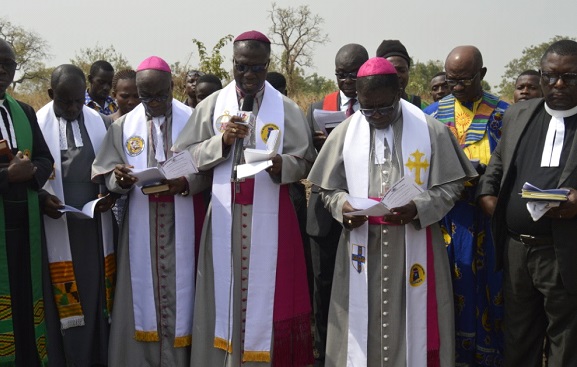Leaders of the Methodist Church at the sod-cutting ceremony
To enhance the propagation of the gospel, the Methodist Church, Ghana has cut sod for the construction of its first chapel in Dambai, the Oti Regional capital.
The project expected to be completed in four months is being financed by the Lay Movement Council of the church at an estimated cost of GH¢350.000.
The church edifice will include a 350-seating capacity auditorium, a sanctuary, four offices, vestry, changing rooms, washrooms and a Sunday school unit for children.
Most Reverend Dr. Paul Kwabena Boafo, Presiding Bishop of the church who was assisted by the Lay President, Bro. Bernard Clement K. Botwe, to cut the sod, described the event as ‘a significant day in the history of The Methodist Church, Ghana’.
He said the church was not only bringing the spiritual life of the people up to date but also aims to bring development to Dambai.
The presiding bishop pledged the church’s readiness to support and work with government agencies and officials in order to achieve the needed development for the people in the Oti Region.
Dr. Boafo noted that in the 185 years existence of Methodism in Ghana, the presence of the church has not been felt in Dambai. He, therefore, encouraged all Methodists who find themselves in any part of the Oti Region “to hold onto the Methodist faith and champion the propagation of the gospel.”
On behalf of the church, he expressed gratitude to the chiefs and people of Dambai for ‘receiving and accepting’ the church in the region.
Nana Kwaku Beyennor II, Nifahene of Chonke Traditional Area and Chief of Dambai, who donated 16 plots of land to the church, commended the church for extending the faith to Dambai, adding that the step taken would in a long way bring development to the area.
Nana Beyennor II appealed to the church to, as a matter of urgency, put up other facilities such as hospitals and schools in the area and pledged the support of the Traditional Area in helping the church to embark on the projects.
By Jamila Akweley Okertchiri

